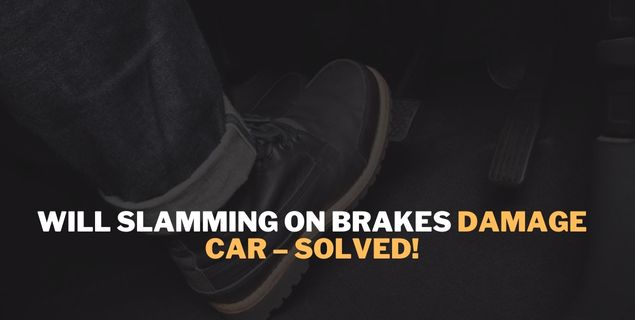Discover the truth about aggressive braking! Learn if the common practice of “Will Slamming on Brakes Damage Car” holds weight. Explore the potential consequences of abrupt stops, get tips on responsible driving, and find out how to preserve your vehicle’s braking system for the long run. Drive smarter, drive safer!
Will Slamming on Brakes Damage Car?
Slamming on the brakes occasionally in emergency situations is unlikely to cause immediate damage to your car. Modern vehicles are equipped with advanced braking systems designed to withstand certain levels of stress. However, repeated and aggressive slamming on the brakes can have adverse effects on various components.
Brake pads and rotors, essential parts of the braking system, may experience accelerated wear and tear, compromising efficiency over time. The brake fluid, responsible for transmitting force to the brake calipers, can heat up, potentially leading to brake fade. Brake calipers themselves may undergo increased stress, contributing to premature wear.
Additionally, slamming on the brakes can impact tires and suspension, leading to uneven tire wear and potential damage to shocks and struts. While emergency braking is crucial for safety, responsible driving and regular maintenance are key to preserving your vehicle’s braking system in the long run.
What Happens If You Slam on Your Brakes Too Hard?
If you slam on your brakes too hard, several potential consequences may occur. One immediate impact is increased wear and tear on your brake pads and rotors. The intense friction generated by hard braking can lead to accelerated deterioration of these components, potentially causing them to wear out faster than normal. Additionally, aggressive braking increases the temperature of the brake fluid, which may result in brake fade – a temporary reduction in braking efficiency.
The brake calipers, responsible for applying pressure to the brake pads, may also experience heightened stress, contributing to premature wear. Furthermore, abrupt deceleration can adversely affect your tires, causing uneven wear and compromising their overall lifespan. In extreme cases, repeated hard braking can impact the suspension system, potentially leading to damage to shocks and struts.
To avoid these issues, it’s essential to practice responsible driving habits and incorporate gradual braking whenever possible. Regular brake inspections and maintenance can help identify and address any wear and tear promptly, ensuring the longevity and optimal performance of your braking system.
Certainly, here are a few hypothetical cases illustrating the potential consequences of slamming on the brakes too hard:
Case of Premature Brake Wear:
Scenario: John frequently encounters heavy traffic during his daily commute. In an attempt to avoid collisions, he consistently slams on his brakes abruptly. Over time, this aggressive braking leads to premature wear of his brake pads and rotors, diminishing their effectiveness and requiring more frequent replacements.
Brake Fluid Overheating:
Scenario: Sarah is driving downhill on a steep mountain road and repeatedly slams on her brakes to control her speed. The constant hard braking causes the brake fluid to overheat, leading to brake fade. As a result, the braking efficiency diminishes, posing a safety risk in the challenging terrain.
Caliper Stress and Wear:
Scenario: Mike enjoys high-speed driving and frequently engages in sudden stops. The increased stress on the brake calipers, which apply pressure to the brake pads, results in accelerated wear. Eventually, Mike notices reduced braking performance, necessitating caliper replacements sooner than expected.
Uneven Tire Wear:
Scenario: Emily tends to slam on her brakes abruptly whenever she approaches a stop sign. This habit leads to uneven wear on her tires, causing a noticeable difference in tread depth. As a consequence, Emily faces increased tire replacement costs and compromised vehicle stability.
Suspension Strain:
Scenario: Tom frequently engages in aggressive braking maneuvers, especially during sudden lane changes. The abrupt deceleration places strain on his vehicle’s suspension system, leading to premature damage to shocks and struts. This not only affects ride comfort but also necessitates costly repairs.
In each of these cases, the common thread is the adverse impact of aggressive braking on various components of the braking system and the overall vehicle. These examples highlight the importance of adopting responsible driving habits to preserve the longevity and performance of the car’s crucial systems.
What Should I Do to Avoid Slamming on Brakes?
To avoid the need for slamming on your brakes and promote safer driving habits, consider the following tips:
Maintain a Safe Following Distance:
Always keep a safe distance between your vehicle and the one in front of you. This allows you to anticipate stops and react gradually, reducing the likelihood of abrupt braking.
Anticipate Traffic Flow:
Stay aware of the traffic conditions ahead. Look beyond the car directly in front of you to anticipate changes in speed and avoid sudden stops.
Use Engine Braking:
When approaching a stop, downshift and use engine braking to slow down gradually. This helps distribute the braking force more evenly and reduces the strain on your brake components.
Smooth Acceleration and Deceleration:
Practice smooth and gradual acceleration and deceleration. Avoid rapid changes in speed, as these can contribute to the need for sudden stops.
Observe Traffic Signals and Signs:
Pay close attention to traffic signals, signs, and road conditions. Being aware of upcoming stops allows you to adjust your speed appropriately without the need for abrupt braking.
Keep Your Vehicle Well-Maintained:
Regularly service and maintain your vehicle, especially the braking system. Ensure that brake pads, rotors, and other components are in good condition to optimize braking performance.
Avoid Tailgating:
Resist the temptation to tailgate other vehicles. Maintaining a safe following distance provides you with more reaction time and minimizes the chances of sudden stops.
Practice Defensive Driving:
Adopt a defensive driving mindset by staying vigilant, anticipating potential hazards, and being prepared to respond proactively. This approach can help you avoid emergency braking situations.
Take Driving Courses:
Consider enrolling in defensive driving courses to enhance your driving skills. These courses often provide valuable insights into safe driving practices and emergency maneuvering techniques.
Be Mindful of Road Conditions:
Adjust your driving behavior based on road conditions. In inclement weather or on uneven surfaces, exercise extra caution and reduce your speed to avoid the need for sudden stops.
Conclusion
In conclusion, the impact of slamming on the brakes is a nuanced consideration for drivers. While occasional emergency braking is unlikely to cause immediate damage to your car, repeated and aggressive behavior can lead to adverse consequences. The key lies in striking a balance between ensuring immediate safety in emergency situations and adopting responsible driving habits to preserve the longevity and efficiency of your vehicle’s braking system.
By maintaining a safe following distance, anticipating stops, and practicing smooth deceleration, you can mitigate the potential risks associated with abrupt braking. Regular maintenance and awareness of the overall condition of your braking system are crucial elements in promoting both safety and the health of your vehicle on the road. Remember, a mindful and proactive approach to driving contributes significantly to a smoother, safer, and more enjoyable journey.

